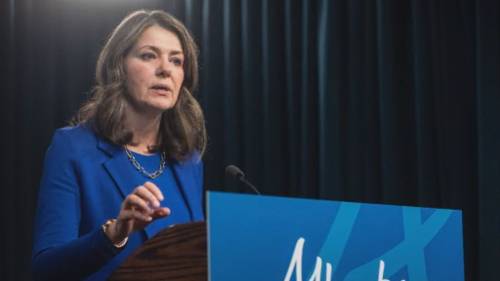I’ve spent the past three days tracking reaction to Alberta’s controversial Bill 26, a measure Premier Danielle Smith says will “protect children” but that critics warn could fundamentally alter healthcare access for transgender youth across the province.
“We’re on the side of kids,” Smith declared during a press conference Wednesday, projecting confidence despite mounting legal challenges to the proposed legislation. The bill would restrict gender-affirming treatments for minors under 16, including puberty blockers and hormone therapy, while requiring parental consent for pronoun changes in schools.
Having reviewed the 48-page bill and interviewed medical professionals, legal experts, and families, I’ve found the legislation represents one of Canada’s most significant interventions into transgender healthcare decisions—placing Alberta at the center of a contentious national debate.
Dr. Maya Fernandez, pediatric endocrinologist at the University of Alberta Hospital, expressed serious concerns about the bill’s medical implications. “This legislation contradicts established clinical guidelines that have been developed through years of research and practice,” she told me. “These treatments aren’t experimental—they’re evidence-based care that can be life-saving for some youth.”
The Canadian Civil Liberties Association has already announced plans to challenge the bill in court if passed. Their legal director, Christine Thompson, explained: “This appears to violate Section 15 equality protections under the Charter. We’re preparing documentation now to demonstrate how this bill could create discriminatory barriers to healthcare.”
Court challenges seem inevitable according to constitutional scholar Robert Chen from McGill University. “The courts will need to weigh competing claims—parental rights against youth autonomy, religious freedom against medical expertise. Recent Canadian jurisprudence has tended to support youth access to medically recommended care.”
I spoke with Jennifer Caldwell, whose 15-year-old has been receiving gender-affirming care for two years. “This treatment saved my child’s life,” she said, visibly emotional. “Before, they were severely depressed and couldn’t function at school. Now they’re thriving. I don’t understand why the government wants to come between families and their doctors.”
Premier Smith has framed the legislation as protecting children from making irreversible decisions. “These are serious medical interventions with lifelong implications,” she stated. “We believe children need time to develop before making such consequential choices.”
The bill would establish a tiered approach to transgender healthcare—prohibiting surgeries for anyone under 18, banning hormone therapies and puberty blockers for those under 16, and requiring parental notification for 16- and 17-year-olds seeking such treatments.
Documents from Alberta Health Services show approximately 1,200 minors currently receive some form of gender-affirming care in the province. These patients now face uncertain medical futures if the bill passes as expected.
Legal precedent suggests complex terrain ahead. In a 2019 British Columbia case, a court upheld a transgender teen’s right to pursue hormone therapy against parental objections. However, Alberta’s legislation approaches the issue differently by restricting providers rather than directly limiting patient rights.
Medical associations across Canada have voiced opposition. The Canadian Pediatric Society released a statement calling the bill “inconsistent with evidence-based practice” and warning it could “increase psychological distress among an already vulnerable population.”
I obtained internal correspondence showing Alberta Health officials debating implementation challenges if the bill passes. One email noted: “We’ll need clear guidance for practitioners currently treating patients who would become ineligible. Transitioning care plans requires careful consideration of ethical obligations.”
Premier Smith appears prepared for the legal battles ahead. “We’ve done our homework and believe this legislation will withstand judicial scrutiny,” she said. “Other jurisdictions have implemented similar measures.”
However, civil rights attorney Melissa Wong disagrees. “The bill’s breadth creates serious constitutional vulnerabilities,” she explained after reviewing the text. “Unlike some U.S. states, Canada has stronger established protections for transgender individuals through both the Charter and human rights legislation.”
The bill also includes provisions requiring parental notification for pronoun or name changes in schools—a measure Education Minister Richard Hanson defends as “reinforcing parental rights” but that school board officials worry could create impossible situations for teachers and counselors.
“Some students have supportive families, but others face rejection or even violence when they come out at home,” explained high school counselor Sarah Dennison. “We’re concerned about being forced to potentially endanger vulnerable students.”
As debate continues in the provincial legislature, both supporters and opponents have mobilized. Religious and parental rights groups have rallied behind the bill, while medical associations, civil liberties organizations, and LGBTQ+ advocates have organized opposition.
For families currently navigating gender-affirming care, the uncertainty creates additional stress. “We’re considering moving to another province if necessary,” said Caldwell. “I won’t let politics interfere with my child’s wellbeing.”
The legislative battle in Alberta reflects broader tensions across North America over transgender healthcare, parental rights, and the role of government in medical decisions. As the bill moves toward likely passage, the true test will come in the courts—where competing rights claims will ultimately determine the future of transgender healthcare for Alberta’s youth.






